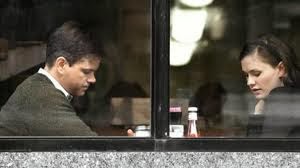Margaret – Kenneth Lonergan – A precocious 17 year old, Lisa, witnesses a traumatic road accident in which a woman is knocked down and killed by a bus. The rest of the film’s narrative follows Lisa in her painful attempt to emotionally digest what her part in the accident may, or may not, have been. At the age of 17, the trauma of the event is shrouded, accelerated and exacerbated by an onslaught of severely unfortunate adolescent experiences, all of which are in turn warped in the wake of the accident. In the midst of such formative experiences, the accident embodies an intrusion of the ‘real’ (not in an overly theorised Lacanian sense…more of a, ‘in a life of self consciously, privileged New York existence, scenes of death are, as in most places, hard hitting’ kind of ‘real’) and visceral gravity of life, death, mortality and all the gore stained consequences therein. In short, it is a experience that exceeds the remits of her classroom confidence and high school, social buoyancy…to be fair, holding a dying stranger in your arms, as her blood matts your hair and her fading eyes wildly search your own – is probably going to put most people, regardless of maturity, out of kilter. Paired with a condensed sightseeing tour of wayward, coming of age, anguish (trying drugs, loosing friends, losing virginity, seducing a teacher, struggling against family, loosing any sense of self) the accident reveals a ‘reality’ incompatible with what, until now, was always a hypothetical morality. The performances are consistently strong, especially Anna Paquin and J. Smith Cameron – as Lisa and her mother, Joan. In fact it is the scenes between mother and daughter that are perhaps the most riveting in the film. Anna brings all the right notes (in all their uncontrollable discordance) to the vulnerability, violence and immaturity of Lisa’s emotions, while J. Cameron lends Joan’s character a believable and lonely fatigue, caught between stoic endurance and the brittle imminence of a break down. It is the characters, performance and dialogue that, each in part, are so compelling and strong. Unfortunately, the sum of those parts feels overly ambitious and misguided.
The film was cut down to 150 minutes, on the studio’s insistence and with help from Martin Scorsese and Thelma Schoonmaker (a regular editor with Scorsese). The version I watched was the extended three hour cut. Lonergan clearly had ambitions of portraying a panoramic portrait of New York, alongside and through the tale of Lisa. This aspiration, for a more transcendent evocation of New York and its multitude of stories, is demonstrated through labouring long pans of cityscape vistas and cut-aways to bustling streets and crowd shots. There is also the interesting, but not entirely successful, decision in the film’s sound to fade up background conversations so that we hear snippets of other stories. One of the continually reoccurring motifs, even if only auditory, in the film is interruption and overlapping. Whether through intrusive sound or conversation, there is always the sense that Lonergan wants us aware of the teeming life that animates the restless city, and that the film’s narrative is just one of thousands that busily coincide and walk past each other every day. The other, perhaps more pertinent, reason is to underline Lisa’s growing realisation that she is not the centre of the world. While the technique is interesting, it soon becomes too transparently exercised. The effect is not dissimilar to punctuating a piece of art with explanatory and patronising sticky notes, keen to outline ‘themes’ at every step; or, as the annoyingly predictable English teacher (Matthew Broderick) routinely asks, after reading an extract of Shakespeare, or some other piece held in hushed reverence: ‘What’s going on here?’




No comments:
Post a Comment